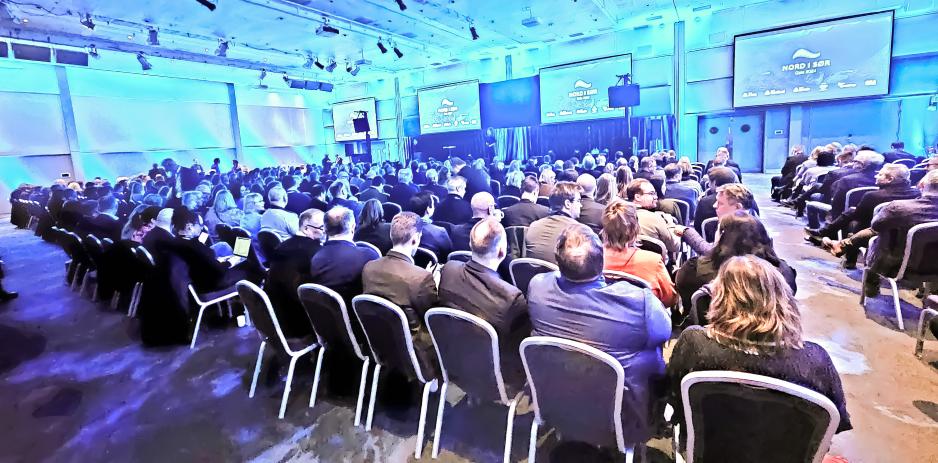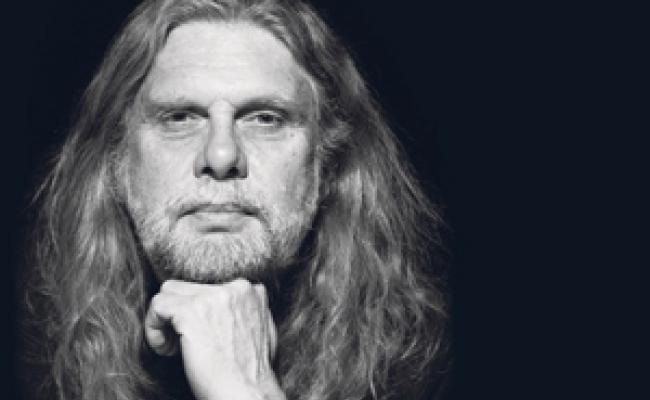I Sometimes Wonder if the Lot of Them Have Become Socialists

More than 400 participants at the NHO conference "The North in the South" in 2023. (Photo: Arne O. Holm)
Commentary: The other day, Norway's biggest bank, DNB, recommended its customers bake a bread for NOK 6 a piece to endure constant rising interest rates. In addition to winter swimming, as a free alternative to gyms.
One could get goosebumps from less. The thermometer was nearing -30 degrees in Oslo.
That is how a bank talks to its customers, a bank that had a profit of 1,7 billion bread last quarter, to stick with this new financial lingo. An increase of 31,2 percent, or 520 million bread, compared to the same period the previous year.
The public conversation
The other day, I discussed the public conversation during the Nord i Sør [the North in the South, ed. translation] conference organized by the Confederation of Norwegian Enterprise (NHO).
More than 400 delegates with sharp and precise wishes on behalf of the Arctic and the High North were present. In a more or less breathless tempo, the debates revolved around tourism, innovation, leadership, demography, seafood, infrastructure, and the green shift.
All of which are central to the North while also complex.
The ambitions are well-known but often falter or halt due to a lack of dialogue. Or controversies, if you like. The difficult discussions.
Yet, crucial to the development of the North.
Can we, as leaders, as authorities, take responsibility for the conversations not collapsing?
The bread Norway's biggest bank recommended we bake cost NOK 6 a piece and was recommended by the bank to make us financially able to withstand the bank's ever-growing profits.
Everyone with a checking account with DNB knows there is not enough money there to yield interest on NOK 6.
Never. The interest rate on the checking account is 0. Zero.
Politicians who know where they live.
Green coal
Shortly ago, a battery factory lowered its green flag in Mo i Rana and flew out to the coal-driven Delaware, USA.
That is the talk of a business sector trying to convince us that we are all part of the fight to save the planet, while so far, it has been a fight for state funding of record-high bonuses, stock options, and board fees.
Competitive, but not wage-leading, is the mantra for a business sector that does not take its own promises seriously. The capital goes where profit is best. Such is capitalism.
Now, capital goes to the state. I sometimes wonder if everyone at the top of the food chain has become socialists.
I sometimes feel alone in believing in the private business sector.
The green shift needs a business sector that takes its own promises seriously.
We need a tax debate where the premises are not solely laid down by those who earn the most when the community's challenges are put under pressure. Moving to Switzerland is an honest matter, seen from my more or less anarchist point of view.
But it does not yield a double vote in Norwegian elections - rather the opposite.
Carpet-bombing of Finnmark
We need an energy debate in touch with reality, not an agitation inspired by Durek Verret. The Finnmark power package does not carpet-bomb the Finnmark plains with windmills, if by 'carpet' we mean a small rag covering less than one percent of the floor.
We are saying no to wind power but yes to nuclear power – in thirty or fifty years. The energy prices are currently record-high. The reason is the closed nuclear power plants in Sweden.
We need a business sector that does not talk about 'discrepancies' when the norm is that 25 percent of animal production dies while earnings are at an all-time high.
A business sector that makes the fisheries director Frank Bakke Jensen ask how there could be more fish in the cages after escaping than before.
More profitable to court prejudice.
We need politicians who know where they live and where they have been when they write travel expenses. Who takes conflict of interest seriously.
We need editors and journalists who understand they are an extension of democracy, not polarizing internet trolls.
It is easy to point to the US to emphasize what a lack of dialogue across disciplines, cultures, backgrounds, economy, and power can lead to. Yet, I do not have to go further than Sweden, where the debate has been cowed and canceled for years already.
The Swedish community model, where filthy rich family dynasties, a nobility if you will, have controlled the business sector. This model has now received competition from criminal networks. Criminal networks have copied the Swedish nobility.
Swedish researchers say that the gap between power and powerlessness, between wealth and poverty, has indirectly given legitimacy to illicit copies of those same constructions.
Talk with each other
A public debate requires that we talk with each other, not to each other.
But what is really happening when the government parties' local associations collectively withdraw from the party when the debate is at its most important? When it revolves around hospital structures or the development of the power grid?
I often run into problems because my references have passed away or become meek as lambs. We buried Ole Paus the other day, who must be said to fulfill both criteria. Some reacted to the fact that Paus was not buried at the state's expense.
The Ole Paus I got to know wanted as little as possible to do with the state, in contrast to large parts of the Northern Norwegian business sector.
Other references are still alive, like the 94-year-old philosopher Jürgen Habermas.
His scientific theory encompassed several disciplines and was fundamentally about inviting dialogue. He was in no way toothless, quite the opposite actually, but he managed to change position and take in other people's arguments.
He developed and encouraged us to listen to each other. He talked about "the power of the better argument."
Our entire civilization is based on such an assumption.
It is not the rebels who challenge.
Who are the people?
It is this standpoint, this power, we could lose when the power structures, whether power is about money, education, access to lawyers, or PR agents, access to a newspaper staff, or a TV channel, replaces the "power of the argument."
Who the people are, said Habermas, we can only know when the rule of law works, when democracy works. When everyone can voice their opinion.
One of the most heated debates we have in the North at the moment revolves around the hospital structure. The national focus on the healthcare system in the North is limited. The local engagement, however, is massive.
Every hospital in the North has its own local newspaper, and most local newspapers have a hospital. It is in the essence of the local newspaper that they cheer for their own. The editorial coverage of a hospital dispute does not significantly differ from a football match, with the difference that the editorial focus is on football, but not on medical journalism.
In other words, there is football expertise mixed with chauvinism in the newspaper editorial staff, while the chauvinism of medical journalism does not necessarily correlate to the expertise.
When the divide becomes larger, when the press does not necessarily act as a corrective, but rather a polarizing factor in several of the heavy conflicts, that is correlated to a longer development. I have a background largely from the private business sector, and I know the value of earning money in journalism. For a long time, the basis was that people would pay for quality journalism.
That the best would survive. In time, the advertising dollars went to major, international social media. Here, the logarithm was different. Instead of appealing to readers who wanted quality and were willing to pay for it, it has become easier and, above all, more profitable to court prejudice.
Envy us
We live in a country with a freedom that large parts of the world envy us.
Around us, democracies are losing while dictatorships are strengthened. Together with our Nordic neighbors, we are at the top of all statistics that matter to a free human being. Democracy, freedom of the press, and freedom of speech. Most of the world's total of 24 democracies are in Europe, according to the Economist's Democracy Index.
But Europe is not larger than Northern Norway, compared to the rest of the world. Around nine percent and steadily decreasing in relative terms. Within the European democracies, extreme forces are winning terrain; Sweden, Finland, Denmark, Hungary, Turkey, and so on.
We cannot live on bread alone.
On several occasions, I have used the architectural wonder of the breakwater as an example of our hospitality. We built the breakwater to protect us from the ravages of the weather but also to offer sailors from the rest of the world a safe harbor to dock in.
We should take care of that and be careful not to build verbal breakwaters between us, between us and "the others."
In my world, it is not the rebels who challenge the social debate. Instead, it is leaders in the face of reality.
The responsibility for the dialogue, for the conversation, for the force of the argument lies with our leaders, us editors included.
I worry about the debate climate in Norway. Not where it is today, but where it could end up if we do not reduce the difference between those who have power and those who feel powerless.
Just as little as one can sit in Switzerland and decide the Norwegian tax level, just as little as one can sit in the USA and decide the green shift in Norway, just as little can we as authorities demand anything else from the comment section, from the local population, than what we require from ourselves.
Broken from the top
My own pessimism is fueled by what we once saw as a democracy, an America soon to be alone as a European ally in the wider world. Not just alone, but a dominant ally. In the US, the public debate is completely destroyed. It is broken.
It is broken from the top.
Without democracy, without dialogue, we will not be able to achieve any of the goals we set ourselves.
The Northern Norwegian generosity and hospitality is something we must take care of. It is something we must protect. But also something we cannot take for granted.
After all, we cannot live on home-baked bread alone.
The commentary is an edited version of a lecture given during the conference "The North in the South," organized by NHO Nordland and NHO Arctic in Oslo on 8 January this year. Ed.




